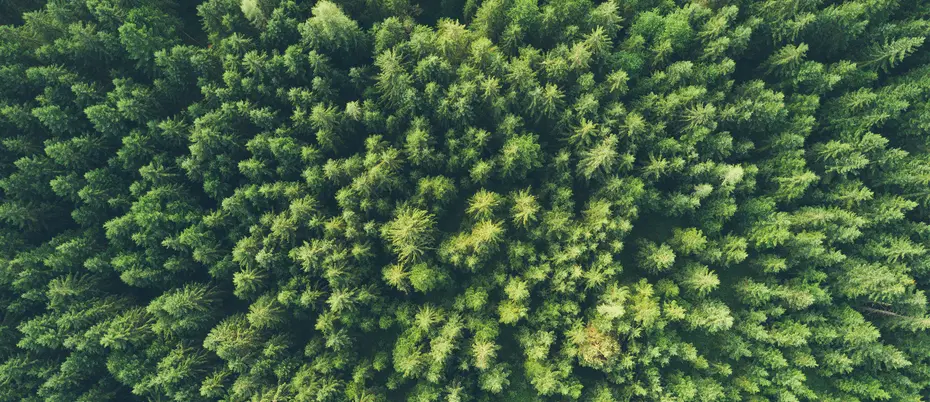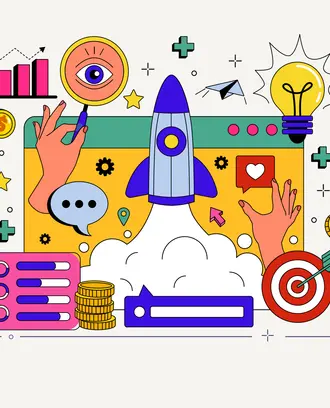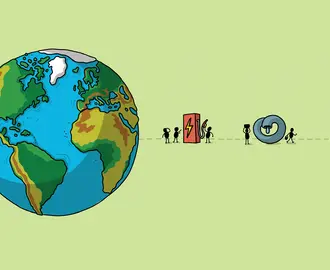Sustainability
From technology and capitalism, a hopeful remedy for the planet
A new book proposes a clear course of action to save the planet: more technology and capitalism, not less.
Remember peak oil? First appearing in 1956, the concept theorized that the world would reach a point when it could no longer increase the rate at which oil was extracted from the earth. From the 1970s through the early aughts, peak oil was a rallying call against consumption and consumerism, a dire warning that the good times would end and humanity would drag the planet into decline.
Then fracking happened, greatly increasing how much oil and natural gas could be pulled from the ground. And renewable energies became cheaper and easier to access. Suddenly, peak oil — while still inevitable — started to look like less of a problem.
This unexpected and welcome neutralization of humanity’s seemingly unquenchable thirst for the earth’s resources is just one example of what MIT Sloan research scientist Andrew McAfee calls dematerialization. That is, through a combination of capitalism, technical progress, and other forces, humanity is doing more while using less.
“More from Less: The Surprising Story of How We Learned to Prosper Using Fewer Resources – and What Happens Next,” McAfee’s new book out Oct. 8 from Scribner, is an unusually optimistic take on the future of the planet and humanity. In the book’s introduction, excerpted below, McAfee lays out his thesis and confronts the criticism that is sure to follow, from environmentalists and capitalists alike.
+++
We have finally learned how to tread more lightly on our planet. It’s about time.
For just about all of human history our prosperity has been tightly coupled to our ability to take resources from the earth. So as we became more numerous and prosperous, we inevitably took more: more minerals, more fossil fuels, more land for crops, more trees, more water, and so on.
But not anymore. In recent years we’ve seen a different pattern emerge — the pattern of more from less. In America — a large, rich country that accounts for about 25 percent of the global economy — we’re now generally using less of most resources year after year, even as our economy and population continue to grow. What’s more, we’re also polluting the air and water less, emitting fewer greenhouse gases, and seeing population increases in many animals that had almost vanished. America, in short, is post-peak in its exploitation of the earth. The situation is similar in many other rich countries, and even developing countries such as China are now taking better care of the planet in important ways.
This book is about how we turned the corner and started getting more from less, and what happens from here forward.
I want to make one thing clear at the start: My argument is not that things are good enough now or that there’s nothing to be concerned about. Those claims would be absurd. Human-caused global warming is both real and bad, and we urgently need to take action to deal with it. We also need to reduce pollution levels around the world and bring back the species we’ve pushed to the brink of extinction. And we have to keep fighting poverty, disease, malnutrition, fraying communities, and other roadblocks to human flourishing.
So we have plenty of work ahead. The broad point I want to make is that we know how to succeed with this work. In large parts of the world we’ve already turned the corner and are now improving both the human condition and the state of nature. The trade-off between the two has ended, and I’m confident it’s never going to reappear if we play our cards right. In these pages I’ll explain where this confidence comes from and try to get you to share it.
The thread of the argument
This book shows that we’ve started getting more from less and tells how we reached this critical milestone. The strangest aspect of the story is that we didn’t make many radical course changes to eliminate the trade-off between human prosperity and planetary health. Instead, we just got a lot better at doing the things we’d already been doing.
In particular, we got better at combining technological progress with capitalism to satisfy human wants and needs. That conclusion will strike many people as bizarre, and for good reason. After all, it’s exactly this combination that caused us to massively increase our resource use and environmental harms starting with the Industrial Revolution in the late eighteenth century. The Industrial Era was a time of startlingly large and fast improvements in human prosperity, but these improvements came at the expense of our planet. We dug out resources, chopped down forests, killed animals, fouled the air and water with pollution, and committed countless other offenses against the earth. We committed more and more of them year after year, apparently without end.
The twin forces of tech progress and capitalism unleashed during the Industrial Era seemed to be impelling us in one direction: that of increasing human population and consumption while degrading our planet. By the time of the first Earth Day festival in 1970, it was obvious to many that these two forces would push us to our doom, since we couldn’t continue to abuse our planet indefinitely.
And what actually happened? Something completely different, which is the subject of this book. As I’ll show, capitalism continued and spread (just look around you), but tech progress changed. We invented the computer, the internet, and a suite of other digital technologies that let us dematerialize our consumption: over time they allowed us to consume more and more while taking less and less from the planet. This happened because digital technologies offered the cost savings that come from substituting bits for atoms, and the intense cost pressures of capitalism caused companies to accept this offer over and over. Think, for example, how many devices have been replaced by your smartphone.
In addition to capitalism and tech progress, two other forces have also been essential for allowing us to get more from less. These are public awareness of the harms we’re doing our planet (such as pollution and species loss) and responsive governments, which act on the desires of their people and put in place sound measures to counteract these harms. Both public awareness and responsive government were greatly accelerated by Earth Day and the environmental movement in the United States and around the world.
I call tech progress, capitalism, public awareness, and responsive government the “four horsemen of the optimist.” When all four are in place, countries can improve both the human condition and the state of nature. When the four horsemen don’t all ride together, people and the environment suffer.
The good news is that all four are at present advancing around the world. So we don’t need to make radical changes; instead, we need to do more of the good things that we’re already doing. Let me switch, metaphorically, from horses to cars: We don’t need to yank the steering wheel of our economies and societies in a different direction; we just need to step on the accelerator.
Something for everyone to dislike
As you read this book, it’ll be important to keep an open mind because you’re likely to come across at least a few ideas and conclusions that won’t at first seem right. I’ve found that the book’s fundamental concept — that capitalism and tech progress are now allowing us to tread more lightly on the earth instead of stripping it bare — is hard for many people to accept.
It was hard for me to accept when I came across it for the first time — in Jesse Ausubel’s amazing essay, “The Return of Nature: How Technology Liberates the Environment,” published in 2015 in the Breakthrough Journal. When I encountered that headline, I had to click on it, which led me to one of the most interesting things I’d ever read.
Ausubel documented the dematerialization of the American economy. Even though he did it carefully and thoroughly, I found myself thinking, “Well, that can’t be right.” It was hard to let go of the notion that, as economies grow, they must consume more resources. Ausubel’s work started me down a path of questioning that notion and eventually rejecting it.
An important part of traveling that research path was coming up with an explanation of how we started getting more from less. What caused economic growth to become decoupled from resources consumption? What caused dematerialization to take over? As I’ve already mentioned and as you’ll see in the chapters ahead, capitalism is a big part of my explanation.
This is not a universally popular conclusion. Ever since Marx, capitalism has been passionately opposed by many — and viewed with much skepticism by many more. So my cheerleading for it is going to strike many as ignorant, or worse. If you’re one of those people, I’m glad you’re reading this book. I hope that you’ll listen to what I mean when I talk about capitalism and evaluate my arguments based on the evidence and logic I present.
And if you’re a fan of capitalism, you might not like that I argue here in favor of new taxes (on carbon) and strict regulation (on pollution and trade in products from endangered animals). Many ardent capitalists will dislike these ideas. I also propose more nuclear power and genetically modified organisms, both of which are adamantly opposed by many people.
So just about any reader will probably initially feel that something in this book is wrong. Again, I just ask that you approach the book’s ideas with an open mind. I hope you’ll believe that I’m arguing in good faith. My intention here is not to write a polemic or start a flame war. I’m not trying to troll or dunk on anyone (in other words, I’m not trying to provoke anyone into losing their temper or to demonstrate my superiority). I’m just trying to highlight a phenomenon that I find fascinating and deeply encouraging, explain how it came about, and discuss its implications. I hope you’ll come along for the journey.
Excerpted from MORE FROM LESS: The Surprising Story of How We Learned to Prosper Using Fewer Resources — and What Happens Next by Andrew McAfee. Copyright © 2019 by Andrew McAfee. Excerpted with permission by Scribner, a Division of Simon & Schuster Inc.




